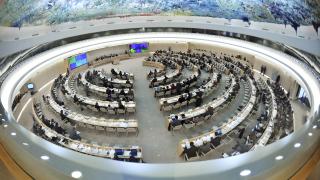
On Thursday (7 October) the UN Human Rights Council voted against renewing the mandate for the Group of Eminent Experts on Yemen (GEE).
Members voted against a resolution brought by the Netherlands to extend the mandate of the investigators for another two years. The 47 member council narrowly rejected the resolution after 21 states, including China, Russia and India, voted against and 7 abstained.
The international community’s failure to uphold this vital impartial international investigation into the war crimes being committed in Yemen is deeply worrying as parties to the conflict continue to wage a war with devastating consequences. Speaking before the council, UN human rights chief Michelle Bachelet said:
“Numerous attacks targeting or disproportionately impacting civilians or civilian objects during the past year may amount to war crimes.”
Currently the people of Yemen are suffering the world’s worst humanitarian crisis, with over 80% of the population dependent on aid, tens of thousands have been killed and millions displaced.
The GEE was the only independent and impartial mechanism working to deter war crimes and violations by all parties.
Their latest report “A nation abandoned: a call to end Yemen’s suffering” outlined the ongoing suffering Yemenis have had to endure, and concluded that “some of the violations identified may amount to international crimes”.
Radhya Almutawakel, Chairperson of Mwatana for Human Rights, a prominent Yemeni human rights organization said that failing to renew the mandate for investigators was a “green light” for ongoing violations and would “condemn millions in Yemen to ‘unremitting violence, death and constant fear.’”
It has been reported that Saudi Arabia, a party to the conflict whose actions have been scrutinised by the GEE, lobbied intensively against the resolution. Although Saudi Arabia is not a voting member of the council, experts have noted the failure to pass this resolution amounts to a capitulation to Saudi interests.
Jeremie Smith, Director of the Geneva Office of the Cairo Institute for Human Rights Studies (CIHRS), speaking before the vote, said, “the choice before member states of the Council is clear – either cave into Saudi pressure or vote to renew the GEE.”
Ahead of the vote, UNA-UK worked with other NGOs to make the case for the UK to proactively urge all members of the Human Rights Council to support the renewal of the GEE mandate. Despite the UK’s positive vote, which was welcome, we regret that efforts to counter the lobbying of those looking to dissolve the GEE were insufficient. In addition, we remain deeply concerned that the UK continues to provide extensive support to the Saudi military, including over £1.3 billion on missiles and components for bombs since the moratorium of new licences for exports to Saudi Arabia was lifted on 7 July 2020.
We renew our call for the UK to immediately suspend all arms export licences to Saudi Arabia and all other parties to the conflict in Yemen.
As the mandate for the GEE has now ended with the close of the 48th session of the Human Rights Council, it is vital that the international community works to provide support for parties seeking to strengthen accountability mechanisms. The Yemen country office for the Office of the High Commissioner for Human Rights should be supported to monitor and report on the human rights situation in the country. Additionally, the Special Envoy of the Secretary-General for Yemen, Hans Grundberg, must be supported in his efforts to mediate an end to the conflict and establish lasting and inclusive peace.
In their final statement the GEE recommend the UN Security Council can act by integrating “the human rights dimensions of the conflict in Yemen more fully into its agenda and ensure there is no impunity for the most serious crimes by, inter alia, referring the situation in Yemen to the International Criminal Court, and expanding the list of persons subject to Security Council sanctions.”
Ultimately, the failure to pass this resolution also marks a significant blow to the credibility of the council. The undue influence of any party to lobby a vote that will allow it and others to avoid scrutiny is unacceptable and flies in the face of the most basic rights assigned to all humans in the preamble of the UDHR: the right to “freedom, justice and peace in the world”.
There can be no justice without accountability, and there can be no accountability in Yemen without an impartial investigation into possible war crimes. Following the vote, the GEE themselves stated that this is “a major setback for all victims who have suffered serious violations during the armed conflict that has been raging for over six years in Yemen”.
Read more:
Photo: UN Human Rights Council, Geneva. c. UN Photo/Jean-Marc Ferré




